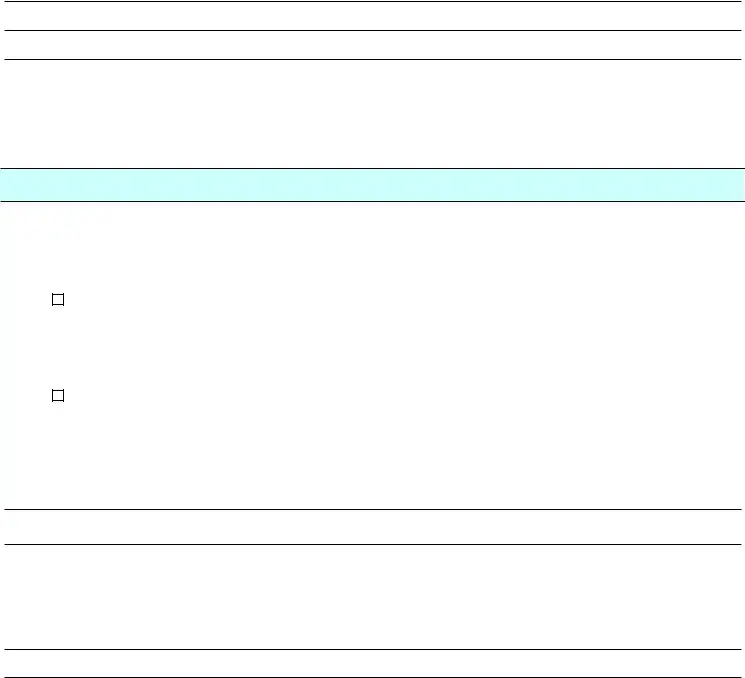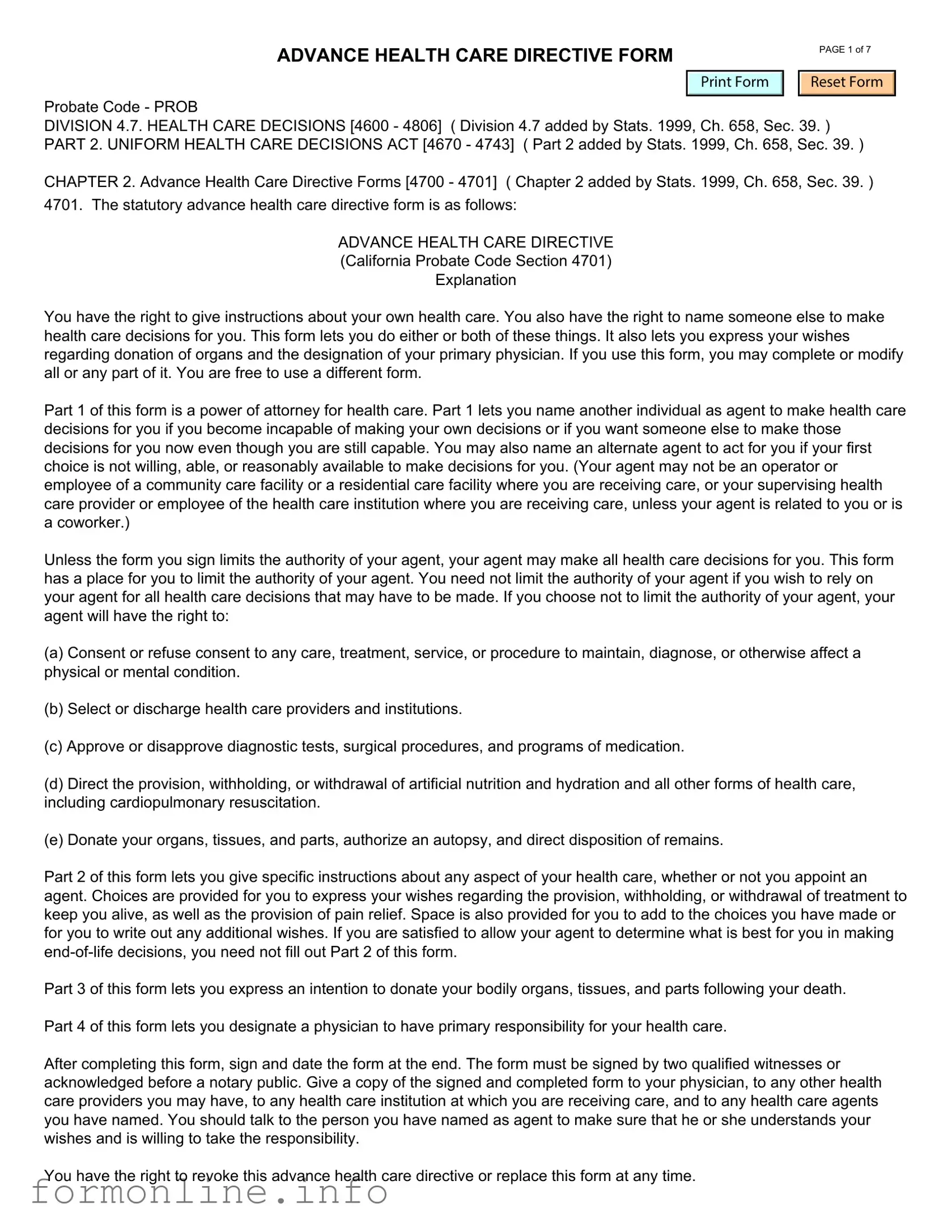Fill Out a Valid California Advanced Health Care Directive Form
In California, the Advanced Health Care Directive form serves as a vital tool for individuals seeking to outline their medical preferences and appoint a trusted person to make healthcare decisions on their behalf in the event they become unable to communicate those wishes. This document combines two essential components: a health care power of attorney and a living will. By designating a healthcare agent, individuals ensure that someone they trust will advocate for their medical needs, respecting their values and preferences. Additionally, the living will aspect allows individuals to specify their desires regarding life-sustaining treatments, organ donation, and other critical healthcare decisions. This form not only empowers individuals to take control of their medical care but also alleviates the burden on family members during emotionally challenging times. Understanding the importance of this directive can lead to more informed choices and peace of mind for both the individual and their loved ones.
Common mistakes
-
Not Discussing Their Wishes: Many people fill out the form without having a conversation with their loved ones. This can lead to confusion and disagreements later on.
-
Choosing the Wrong Agent: Selecting someone who may not understand your values or wishes can create issues. It's important to choose someone who will advocate for you effectively.
-
Leaving Sections Blank: Omitting information can lead to uncertainty about your wishes. Fill out all relevant sections to ensure clarity.
-
Using Ambiguous Language: Vague terms can be interpreted in different ways. Be specific about your preferences to avoid misinterpretation.
-
Not Updating the Directive: Life circumstances change. Failing to update your directive can result in outdated decisions that no longer reflect your current wishes.
-
Not Signing or Witnessing the Document Properly: The directive must be signed and witnessed according to California law. Neglecting this step can invalidate the document.
-
Ignoring State-Specific Requirements: Each state has its own laws regarding advanced directives. Make sure you follow California's specific guidelines to ensure your directive is valid.
-
Failing to Communicate the Existence of the Directive: Simply having the directive isn’t enough. Inform your family, friends, and healthcare providers about its existence and location.
Preview - California Advanced Health Care Directive Form

ADVANCE HEALTH CARE DIRECTIVE FORM |
|
PAGE 1 of 7 |
|
|
|
|
|
|
|
|
|
|
Print Form |
|
Reset Form |
Probate Code - PROB
DIVISION 4.7. HEALTH CARE DECISIONS [4600 - 4806] ( Division 4.7 added by Stats. 1999, Ch. 658, Sec. 39. ) PART 2. UNIFORM HEALTH CARE DECISIONS ACT [4670 - 4743] ( Part 2 added by Stats. 1999, Ch. 658, Sec. 39. )
CHAPTER 2. Advance Health Care Directive Forms [4700 - 4701] ( Chapter 2 added by Stats. 1999, Ch. 658, Sec. 39. )
4701. The statutory advance health care directive form is as follows:
ADVANCE HEALTH CARE DIRECTIVE
(California Probate Code Section 4701)
Explanation
You have the right to give instructions about your own health care. You also have the right to name someone else to make health care decisions for you. This form lets you do either or both of these things. It also lets you express your wishes regarding donation of organs and the designation of your primary physician. If you use this form, you may complete or modify all or any part of it. You are free to use a different form.
Part 1 of this form is a power of attorney for health care. Part 1 lets you name another individual as agent to make health care decisions for you if you become incapable of making your own decisions or if you want someone else to make those decisions for you now even though you are still capable. You may also name an alternate agent to act for you if your first choice is not willing, able, or reasonably available to make decisions for you. (Your agent may not be an operator or employee of a community care facility or a residential care facility where you are receiving care, or your supervising health care provider or employee of the health care institution where you are receiving care, unless your agent is related to you or is a coworker.)
Unless the form you sign limits the authority of your agent, your agent may make all health care decisions for you. This form has a place for you to limit the authority of your agent. You need not limit the authority of your agent if you wish to rely on your agent for all health care decisions that may have to be made. If you choose not to limit the authority of your agent, your agent will have the right to:
(a)Consent or refuse consent to any care, treatment, service, or procedure to maintain, diagnose, or otherwise affect a physical or mental condition.
(b)Select or discharge health care providers and institutions.
(c)Approve or disapprove diagnostic tests, surgical procedures, and programs of medication.
(d)Direct the provision, withholding, or withdrawal of artificial nutrition and hydration and all other forms of health care, including cardiopulmonary resuscitation.
(e)Donate your organs, tissues, and parts, authorize an autopsy, and direct disposition of remains.
Part 2 of this form lets you give specific instructions about any aspect of your health care, whether or not you appoint an agent. Choices are provided for you to express your wishes regarding the provision, withholding, or withdrawal of treatment to keep you alive, as well as the provision of pain relief. Space is also provided for you to add to the choices you have made or for you to write out any additional wishes. If you are satisfied to allow your agent to determine what is best for you in making
Part 3 of this form lets you express an intention to donate your bodily organs, tissues, and parts following your death.
Part 4 of this form lets you designate a physician to have primary responsibility for your health care.
After completing this form, sign and date the form at the end. The form must be signed by two qualified witnesses or acknowledged before a notary public. Give a copy of the signed and completed form to your physician, to any other health care providers you may have, to any health care institution at which you are receiving care, and to any health care agents you have named. You should talk to the person you have named as agent to make sure that he or she understands your wishes and is willing to take the responsibility.
You have the right to revoke this advance health care directive or replace this form at any time.

ADVANCE HEALTH CARE DIRECTIVE FORM
PAGE 2 of 7
PART 1
POWER OF ATTORNEY FOR HEALTH CARE
(1.1) DESIGNATION OF AGENT: I designate the following individual as my agent to make health care decisions for me:
(name of individual you choose as agent)
(address) |
(city) |
(state) |
(ZIP Code) |
||
|
|
|
|
|
|
(home phone) |
(work phone) |
|
|
||
OPTIONAL: If I revoke my agent's authority or if my agent is not willing, able, or reasonably available to make a health care decision for me, I designate as my first alternate agent:
(name of individual you choose as first alternate agent)
(address) |
(city) |
(state) |
(ZIP Code) |
||
|
|
|
|
|
|
(home phone) |
(work phone) |
|
|
||
OPTIONAL: If I revoke the authority of my agent and first alternate agent or if neither is willing, able, or reasonably available to make a health care decision for me, I designate as my second alternate agent:
(name of individual you choose as second alternate agent)
(address) |
(city) |
(state) |
(ZIP Code) |
||
|
|
|
|
|
|
(home phone) |
(work phone) |
|
|
||
(1.2) AGENT'S AUTHORITY: My agent is authorized to make all health care decisions for me, including decisions to provide, withhold, or withdraw artificial nutrition and hydration and all other forms of health care to keep me alive, except as I state here:
(Add additional sheets if needed.)
(1.3) WHEN AGENT'S AUTHORITY BECOMES EFFECTIVE: My agent's authority becomes effective when my primary physician determines that I am unable to make my own health care decisions unless I mark the following box.
If I mark this box  , my agent's authority to make health care decisions for me takes effect immediately.
, my agent's authority to make health care decisions for me takes effect immediately.

ADVANCE HEALTH CARE DIRECTIVE FORM
PAGE 3 of 7
(1.4.) AGENT'S OBLIGATION: My agent shall make health care decisions for me in accordance with this power of attorney for health care, any instructions I give in Part 2 of this form, and my other wishes to the extent known to my agent. To the extent my wishes are unknown, my agent shall make health care decisions for me in accordance with what my agent determines to be in my best interest. In determining my best interest, my agent shall consider my personal values to the extent known to my agent.
(1.5) AGENT'S POSTDEATH AUTHORITY: My agent is authorized to donate my organs, tissues, and parts, authorize an autopsy, and direct disposition of my remains, except as I state here or in Part 3 of this form:
:
(Add additional sheets if needed.)
(1.6) NOMINATION OF CONSERVATOR: If a conservator of my person needs to be appointed for me by a court, I nominate the agent designated in this form. If that agent is not wiling, able, or reasonably available to act as conservator, I nominate the alternate agents whom I have named, in the order designated.
PART 2
INSTRUCTIONS FOR HEALTH CARE
If you fill out this part of the form, you may strike any wording you do not want.
(2.1)
(a) Choice Not to Prolong Life
I do not want my life to be prolonged if (1) I have an incurable and irreversible condition that will result in my death within a relatively short time, (2) I become unconscious and, to a reasonable degree of medical certainty, I will not regain consciousness, or (3) the likely risks and burdens of treatment would outweigh the expected benefits, OR
(b) Choice to Prolong Life
I want my life to be prolonged as long as possible within the limits of generally accepted health care standards.
(2.2) RELIEF FROM PAIN: Except as I state in the following space, I direct that treatment for alleviation of pain or discomfort be provided at all times, even if it hastens my death:
(Add additional sheets if needed.)
(2.3) OTHER WISHES: (If you do not agree with any of the optional choices above and wish to write your own, or if you wish to add to the instructions you have given above, you may do so here.) I direct that:
(Add additional sheets if needed.)

|
ADVANCE HEALTH CARE DIRECTIVE FORM |
PAGE 4 of 7 |
|
|
|
|
|
|
|
PART 3 |
|
|
DONATION OF ORGANS, TISSUES, AND PARTS AT DEATH |
|
|
(OPTIONAL) |
|
(3.1) |
Upon my death, I give my organs, tissues, and parts (mark box to indicate yes). |
|
By checking the box above, and notwithstanding my choice in Part 2 of this form, I authorize my agent to consent to any temporary medical procedure necessary solely to evaluate and/or maintain my organs, tissues, and/or parts for purposes of donation.
My donation is for the following purposes (strike any of the following you do not want):
(a)Transplant
(b)Therapy
(c)Research
(d)Education
If you want to restrict your donation of an organ, tissue, or part in some way, please state your restriction on the following lines:
If I leave this part blank, it is not a refusal to make a donation. My
PART 4
PRIMARY PHYSICIAN
(OPTIONAL)
(4.1) I designate the following physician as my primary physician:
(name of physician)
(address) |
(city) |
(state) |
(ZIP Code) |
(phone)
OPTIONAL: If the physician I have designated above is not willing, able, or reasonably available to act as my primary physician, I designate the following physician as my primary physician:
(name of physician)
(address) |
(city) |
(state) |
(ZIP Code) |
(phone)

ADVANCE HEALTH CARE DIRECTIVE FORM
PART 5
PAGE 5 of 7
(5.1) EFFECT OF COPY: A copy of this form has the same effect as the original.
(5.2) SIGNATURE: Sign and date the form here:
(date) |
(sign your name) |
(address) |
(print your name) |
(city) (state)
(5.3) STATEMENT OF WITNESSES: I declare under penalty of perjury under the laws of California (1) that the individual who signed or acknowledged this advance health care directive is personally known to me, or that the individual's identity was proven to me by convincing evidence (2) that the individual signed or acknowledged this advance directive in my presence, (3) that the individual appears to be of sound mind and under no duress, fraud, or undue influence, (4) that I am not a person appointed as agent by this advance directive, and (5) that I am not the individual's health care provider, an employee of the individual's health care provider, the operator of a community care facility, an employee of an operator of a community care facility, the operator of a residential care facility for the elderly, nor an employee of an operator of a residential care facility for the elderly.
First witness |
Second witness |
(print name)
(address)
(city)(state)
(print name)
(address)
(city)(state)
(signature of witness) |
(signature of witness) |
(date) |
(date) |
(5.4) ADDITIONAL STATEMENT OF WITNESSES: At least one of the above witnesses must also sign the following declaration:
I further declare under penalty of perjury under the laws of California that I am not related to the individual executing this advance health care directive by blood, marriage, or adoption, and to the best of my knowledge, I am not entitled to any part of the individual's estate upon his or her death under a will now existing or by operation of law.
(signature of witness) |
(signature of witness) |

ADVANCE HEALTH CARE DIRECTIVE FORM |
PAGE 6 of 7 |
|
PART 6
SPECIAL WITNESS REQUIREMENT
(6.1) The following statement is required only if you are a patient in a skilled nursing
STATEMENT OF PATIENT ADVOCATE OR OMBUDSMAN
I declare under penalty of perjury under the laws of California that I am a patient advocate or ombudsman as designated by the State Department of Aging and that I am serving as a witness as required by Section 4675 of the Probate Code.
(date) |
(sign your name) |
(address) |
(print your name) |
(city) (state) |
|
(Amended by Stats. 2018, Ch. 287, Sec. 1. (AB 3211) Effective January 1, 2019.)

ADVANCE HEALTH CARE DIRECTIVE FORM
PAGE 7 of 7
ACKNOWLEDGMENT
A notary public or other officer completing this certificate verifies only the identity of the individual who signed the document to which this certificate is attached, and not the truthfulness, accuracy, or validity of that document.
State of California,
County of
On |
before me, |
(insert name and title of officer)
personally appeared
who proved to me on the basis of satisfactory evidence to be the person(s) whose name(s) is/are subscribed to the within instrument and acknowledged to me that he/she/they executed the same in his/her/their authorized capacity(ies), and that by his/her/their signature(s) on the instrument the person(s), or the entity upon behalf of which the person
(s) acted, executed the instrument.
I certify under PENALTY OF PERJURY under the laws of the State of California that the foregoing paragraph is true and correct.
WITNESS my hand and official seal.
Signature |
|
(SEAL) |
|
|
|
Other PDF Templates
IRS E-file Signature Authorization - Form 8879 effectively reduces paperwork for taxpayers who e-file.
To ensure a clear and legal transfer of a mobile home, it's important to utilize the appropriate documentation, such as the Mobile Home Bill of Sale, which outlines all necessary details, including buyer and seller information, the description of the mobile home, and the agreed sale price.
Can You File a Lien Without a Notice to Owner in Florida - Property owners may communicate with contractors directly using the information provided in the notice.
Simple Shared Well Agreement Form - Includes provisions for terminating water supply if payments are overdue.
Documents used along the form
The California Advanced Health Care Directive form is a crucial document that allows individuals to express their wishes regarding medical treatment in the event they become unable to communicate. It provides clarity during difficult times, ensuring that personal values and preferences are respected. However, several other forms and documents can complement this directive, enhancing a person's ability to manage their health care and legal affairs effectively.
- Durable Power of Attorney for Health Care: This document designates a specific person to make medical decisions on behalf of an individual if they are incapacitated. It is vital for ensuring that someone trusted can advocate for one's health care preferences.
- Living Will: A living will outlines specific medical treatments an individual wishes to receive or avoid in the event of a terminal illness or irreversible condition. It focuses on treatment preferences rather than appointing a decision-maker.
- Do Not Resuscitate (DNR) Order: A DNR order is a medical order that prevents healthcare providers from performing CPR if a person's heart stops or they stop breathing. This document is essential for those who wish to avoid resuscitation efforts.
- Physician Orders for Life-Sustaining Treatment (POLST): POLST is a medical order that translates a patient's preferences for life-sustaining treatment into actionable orders for healthcare providers. It is particularly useful for individuals with serious health conditions.
- Healthcare Proxy: Similar to a durable power of attorney, a healthcare proxy designates an individual to make health care decisions on behalf of someone else. This document is essential when a person cannot make decisions due to illness or injury.
- Ohio Motor Vehicle Bill of Sale form: This form serves as a crucial document in the process of buying or selling a vehicle within the state. It legally records the transaction, detailing the agreement between the buyer and the seller, and provides evidence of the change in ownership. For more information, visit https://autobillofsaleform.com/ohio-motor-vehicle-bill-of-sale-form/.
- Will: A will is a legal document that outlines how an individual's assets and affairs should be handled after their death. While not directly related to health care, it plays a critical role in overall estate planning.
- Living Trust: A living trust allows individuals to manage their assets during their lifetime and specify how those assets should be distributed after death. It helps avoid probate and can provide for health care decisions as part of estate planning.
- Organ Donation Consent Form: This document indicates an individual's wishes regarding organ and tissue donation after death. It ensures that a person's desire to donate is respected and can be a vital part of health care planning.
Incorporating these documents alongside the California Advanced Health Care Directive can create a comprehensive approach to managing health care decisions and personal affairs. Each form serves a unique purpose, and together they provide a robust framework for ensuring that one's wishes are honored in various situations.
Similar forms
The California Advanced Health Care Directive (AHCD) is similar to a Living Will. Both documents allow individuals to outline their preferences regarding medical treatment in situations where they cannot communicate their wishes. A Living Will typically focuses on end-of-life care, specifying the types of medical interventions a person does or does not want. This ensures that healthcare providers respect the individual’s choices, aligning treatment with their values and desires.
Another document akin to the AHCD is a Durable Power of Attorney for Health Care. This legal form designates a person, known as a healthcare agent, to make medical decisions on behalf of the individual if they become incapacitated. While the AHCD can include preferences about treatment, the Durable Power of Attorney emphasizes the appointment of a trusted person to make those decisions, providing a broader scope of authority in health-related matters.
The Do Not Resuscitate (DNR) order is also similar to the AHCD. A DNR specifically instructs medical personnel not to perform CPR if a person's heart stops or they stop breathing. While the AHCD covers a wide range of medical decisions, the DNR focuses narrowly on resuscitation efforts. Both documents reflect a person’s wishes regarding medical interventions, particularly in critical situations.
The Physician Orders for Life-Sustaining Treatment (POLST) form shares similarities with the AHCD as well. POLST is a medical order that translates a patient’s preferences into actionable orders for healthcare providers. While the AHCD is a more comprehensive document outlining various healthcare preferences, POLST is often used in emergencies and is recognized by emergency medical services, ensuring that a patient’s wishes are honored promptly.
A Health Care Proxy is another document comparable to the AHCD. This form allows individuals to appoint someone to make healthcare decisions on their behalf. Like the Durable Power of Attorney for Health Care, the Health Care Proxy emphasizes the importance of having a trusted individual who can advocate for the patient’s wishes when they cannot do so themselves. Both documents serve to ensure that a person’s healthcare preferences are respected.
The Mental Health Advance Directive is similar in that it allows individuals to express their preferences for mental health treatment in advance. This document can specify treatment options, medications, and the appointment of a representative to make decisions during a mental health crisis. Like the AHCD, it aims to provide guidance to healthcare providers and loved ones about the individual’s wishes during challenging times.
The Five Wishes document also bears resemblance to the AHCD. It is a comprehensive advance directive that covers not only medical decisions but also personal, emotional, and spiritual wishes. Five Wishes encourages individuals to think deeply about their values and preferences, ensuring that their desires are communicated clearly to family and healthcare providers, much like the AHCD.
The Georgia Residential Lease Agreement is a crucial document for anyone looking to rent a home in this state, and it is essential to understand its terms fully. As with any legal agreement, having clear and concise language helps both landlords and tenants know their rights and obligations. By utilizing resources such as georgiapdf.com/, both parties can ensure they are informed and protected throughout the leasing process.
The Advance Directive for Mental Health Treatment is another document that aligns with the principles of the AHCD. This document allows individuals to specify their preferences for mental health care and appoint a decision-maker. It ensures that their wishes regarding mental health treatment are honored, particularly when they may not be in a position to advocate for themselves.
The Uniform Health Care Decisions Act (UHDCA) provides a framework similar to the AHCD. This act standardizes advance directives across states, allowing individuals to make health care decisions in a legally recognized manner. While the AHCD is specific to California, the UHDCA serves as a guideline that can influence how advance directives are created and implemented in various jurisdictions.
Finally, the End-of-Life Option Act in California is related to the AHCD in that it allows individuals to make decisions about their end-of-life care. This law provides a legal framework for terminally ill patients to request medication to end their life peacefully. While the AHCD focuses on treatment preferences, the End-of-Life Option Act addresses the right to choose a dignified death, reflecting the individual’s values and wishes regarding their life’s conclusion.
Dos and Don'ts
When filling out the California Advanced Health Care Directive form, it's important to approach the process thoughtfully. Here are ten essential dos and don’ts to consider:
- Do ensure you understand the purpose of the directive before starting.
- Do discuss your wishes with family members or loved ones.
- Do choose a trusted person as your health care agent.
- Do be clear and specific about your medical preferences.
- Do sign and date the form in front of a witness or notary public.
- Don't rush through the form; take your time to think it over.
- Don't leave any sections blank; complete all required fields.
- Don't forget to update the directive if your wishes change.
- Don't assume your health care agent knows your preferences without discussing them.
- Don't ignore state-specific requirements; ensure compliance with California laws.
Key takeaways
Filling out and using the California Advanced Health Care Directive form is an important step in ensuring that your healthcare wishes are respected. Here are key takeaways to consider:
- The form allows you to appoint a healthcare agent who will make medical decisions on your behalf if you are unable to do so.
- You can specify your preferences for medical treatment, including life-sustaining measures and end-of-life care.
- It is crucial to discuss your wishes with your chosen healthcare agent to ensure they understand your values and preferences.
- The directive must be signed and dated in the presence of a witness or a notary public to be legally valid.
- You can update or revoke the directive at any time, provided you follow the proper procedures.
- Keep copies of the completed directive in accessible locations, and share them with your healthcare agent and family members.
- Review the directive periodically to ensure it still reflects your wishes, especially after major life events.
How to Use California Advanced Health Care Directive
Filling out the California Advanced Health Care Directive form is an important step in planning for your future healthcare needs. Once you have completed the form, it is crucial to ensure that it is signed, witnessed, and stored in a safe place. You may also want to discuss your decisions with your family and healthcare providers to ensure everyone understands your wishes.
- Begin by downloading the California Advanced Health Care Directive form from a reliable source or obtain a physical copy.
- Read through the entire form carefully to understand its sections and what information is required.
- Fill in your full name, address, and date of birth in the designated areas at the top of the form.
- Designate a healthcare agent by writing their name and contact information in the appropriate section. This person will make medical decisions on your behalf if you are unable to do so.
- If you wish, name an alternate healthcare agent in case your primary choice is unavailable.
- In the section regarding your healthcare preferences, clearly outline your wishes regarding medical treatment, including any specific procedures or interventions you do or do not want.
- Consider adding any additional instructions that reflect your values and beliefs about end-of-life care.
- Once you have completed the form, sign and date it at the bottom. Your signature is essential for the document to be valid.
- Have the form witnessed by two individuals who are not related to you and who do not stand to gain from your estate. They must sign the document as witnesses.
- Make copies of the signed form. Keep the original in a safe place and provide copies to your healthcare agent, family members, and your healthcare provider.
